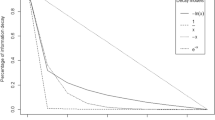Abstract
When introspective data are gathered by means of questionnaires, there are many ways in which results can become invalid. Every diagnostician is familiar with the feeling that the construct presented in a questionnaire is not clearly defined or that the test persons might interpret the items in varying ways. Existing test theories deal with “only” the syntactic aspects of questionnaire data. Too little attention is generally paid to semantic questions dealing with the way in which questionnaire scores are arrived at. Response set research also uses already existing data.
Access this chapter
Tax calculation will be finalised at checkout
Purchases are for personal use only
Preview
Unable to display preview. Download preview PDF.
Similar content being viewed by others
References
Borg, I. (1981). Anwendungsorientierte multidimensionale Skalierung. Berlin Heidelberg New York: Springer.
Cliff, N. (1968). Adjective check list and individual differences in perceived meaning. Educational and Psychological Measurement, 28, 1063–1077.
Fahrenberg, J., Selg, H., & Hampel, R. (1973). Das Freiburger Persönlichkeitsinventar (FPI). Göttingen: Hogrefe.
Janke, W. (1973). Über die Konstruktion von Fragebögen. Bericht über ein Symposium: Das Dilemma von Persönlichkeitsfragebögen. In Reinert, G. (Ed.), Bericht über den 27. Kongreß der Deutschen Gesellschaft für Psychologie in Kiel 1970 (pp. 41–48). Göttingen: Hogrefe.
Janssen, J.P. (1978). Zur Validität von SD-verfälschten Persönlichkeitsfragebogen in Extremsituationen und beim Rollenspiel. Köln: TÜV-Rheinland.
Kastner, M. (1982). Ein Konzept zur internen Validierung psychologischer Fragebogenverfahren. Wuppertal: Habilitationsschrift. Bergische Universität Wuppertal.
Krippendorff, K. (1970). Estimating the reliability, systematic error, and random error of interval data. Educational and Psychological Measurement, 30, 61–70.
Lingoes, J.C., & Roskam, E. (1973). Mathematical and empirical analysis of two multidimensional scaling algorithms. Psychometrica Monograph, 38, (4, Pt. 2).
Rogers, T.B. (1974). An analysis of two central stages underlying responding to personality items: The self-referent decision and response selection. Journal of Research in Personality,5,128–138.
Schneider-Düker, M., & Schneider, J.F. (1977). Untersuchungen zum Beantwortungsprozeß bei psychodiagnostischen Fragebögen. Zeitschrift für experimentelle und angewandte Psychologie, 24, 282–302.
Turner, C., & Fiske, D.W. (1968). Item quality and appropriateness of response process. Educational and Psychological Measurement, 28, 297–315.
Editor information
Editors and Affiliations
Rights and permissions
Copyright information
© 1986 Springer-Verlag Berlin Heidelberg
About this chapter
Cite this chapter
Kastner, M. (1986). Pragmatic Validity to Be Considered for the Construction and Application of Psychological Questionnaires. In: Angleitner, A., Wiggins, J.S. (eds) Personality Assessment via Questionnaires. Springer, Berlin, Heidelberg. https://doi.org/10.1007/978-3-642-70751-3_4
Download citation
DOI: https://doi.org/10.1007/978-3-642-70751-3_4
Publisher Name: Springer, Berlin, Heidelberg
Print ISBN: 978-3-642-70753-7
Online ISBN: 978-3-642-70751-3
eBook Packages: Springer Book Archive




